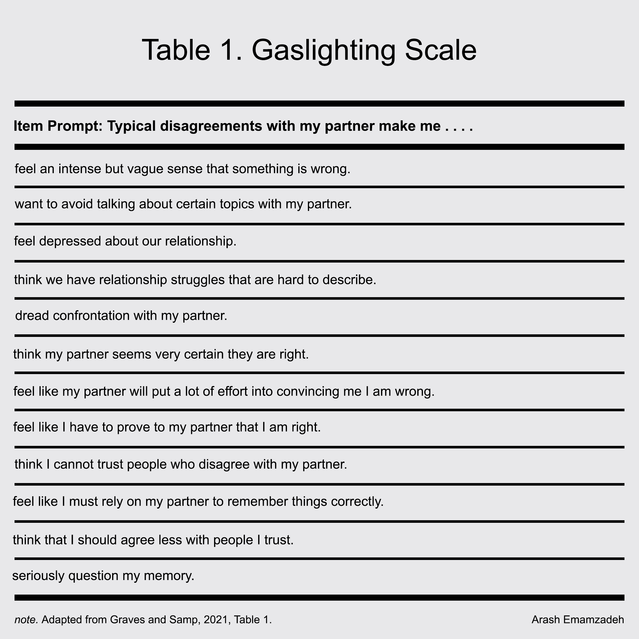Gaslighting
How Power Differences in Relationships Can Lead to Gaslighting
Both the powerless and the powerful can fall prey.
Posted January 30, 2022 Reviewed by Abigail Fagan
Key points
- Gaslighting is a type of psychological abuse that undermines a person’s self-confidence and makes them question their own perception or judgment.
- Gaslighters are often insecure people who feel threatened by being wrong or having their views challenged.
- New research suggests people with low power or high power experience more gaslighting than those with moderate power.

A study by Graves and Samp, published in the November 2021 issue of Journal of Social and Personal Relationships, examines the relationship between gaslighting and power.
Before discussing the findings, here is an introduction to gaslighting.
What is gaslighting?
Wife: “Who were you talking to on the phone just now?”
Husband: “I wasn’t on the phone. You must be imagining things again. Honey, are you ill?”
Wife: “I thought...Oh, sorry, I am not feeling well.”
In reality, the wife was right. But she did not trust her own perception. Why? Due to years of gaslighting. Gaslighting is a psychological control strategy used to manipulate a person's sense of reality and make them doubt their own perceptions, memories, and judgment.
In the gaslighter’s world, only one person’s perspective can matter: the gaslighter’s. The victim’s views, as if the ramblings of a crazy person, are dismissed as not worthy of serious consideration. The gaslighter wants the victim to truly accept the view that they (the victim) are incapable of drawing their own conclusions. Why?
So that, riddled with self-doubt, the victim of gaslighting does not take himself/herself seriously enough to voice an opinion and instead relies completely on the gaslighter’s judgment.
To be clear, gaslighters do not necessarily have the long-term goal of making their romantic partner think themselves ill or crazy. However, because gaslighters cannot tolerate being challenged or thought wrong, their partner having a mind of his or her own is experienced as a major threat, one that must be destroyed.
We now turn to the study by Samp and Graves. These authors define gaslighting in terms of dependence power, or the “capacity to influence derived from relational partners’ reliance on one another.” Gaslighting generates dependence power because the victim of gaslighting gradually depends more and more on the gaslighter—not just for approval (or love, money, and so forth) but to know what is real.
The research, discussed below, explored the link between dependence power and gaslighting.
An investigation of the power to gaslight
The sample: 298 college students; average age of 19 years old; 73 percent female.
Participants completed a questionnaire and reported on current and past dating relationships. The main measures are described below.
Dependence power: High dependence power occurs when a person believes their commitment to the romantic partner is low, their romantic partner’s commitment to them is high, and the partner does not have many alternatives. Six items measured commitment (e.g., “I am committed to having a relationship with my partner”). Two items assessed perceived partner commitment (e.g., “My partner wants to be in a relationship with me”). Seven items assessed perceived partner alternatives (e.g., “If my partner was not with me, they would have another person to be with”).
Gaslighting: Gaslighting experience was evaluated using a scale containing 12 items. For instance, “Typical disagreements with my partner make me feel like my partner will put a lot of effort into convincing me I am wrong.” Or, as a result of the disagreements, “I cannot trust people who disagree with my partner.” These items are listed in Table 1.

Power and gaslighting
Compared to people with moderate power, the results showed, those with low power and those with high power experienced more gaslighting. Why?
First, we need to remember gaslighting is often more subtle than explicit attempts at control and domination, such as attempts that occur during heated conflicts. The gaslighter does not need to exert overt power because, in most cases, the victim of gaslighting wants to avoid conflict (due to fears of rejection or retaliation). In short, the power struggle in gaslighting remains mostly invisible.
Second, when two people have nearly equal power, there are more overt attempts at control because power rankings can change easily. Not so in unequal relationships. In these cases (where one person has a lot of power), it is much more difficult to destabilize hierarchies directly. Therefore, more subtle control attempts are used.
So, while individuals with moderate dependence power are more likely to have their power challenged directly, they are less likely to experience gaslighting (which is a more subtle attempt at control). To compare, those with high or low dependence power tend to experience more gaslighting but less direct attempts at control.
The dynamic where a powerless individual is gaslighted is easy to explain because the powerless are more dependent on the powerful than vice versa. And it is this dependence that powerful gaslighters abuse. But why do powerful people also experience gaslighting?
Perhaps a powerful person is more likely to be gaslighted by a victim of gaslighting. The victim is probably “mimicking the gaslighter’s ‘successful’ conflict behaviors in a futile attempt to regain some of their sense of reality and relieve the attendant psychological consequences of prolonged exposure to gaslighting.”
Takeaway
Gaslighting refers to a control and manipulation technique that undermines victims’ confidence in their perception and judgment so completely that they no longer trust their own thoughts and thus become fully dependent on the gaslighter in their life.
The research reviewed suggests both powerful and powerless people may be gaslighted. However, gaslighting is more successful when it targets a person with less power, particularly one who dislikes conflict, is already dependent on the gaslighter (e.g., for approval, money), has few alternatives to the gaslighter, and has few other meaningful relationships.
Gaslighting can occur occasionally in any relationship; however, it is more common in abusive relationships.
It is important to spot gaslighting early. Some major red flags that you may be a victim of gaslighting include behaviors such as:
- Denying reality. Gaslighters outright lie, try to confuse you, or accuse you of making things up.
- Isolating you. They tell people you are imagining things or tell you that others are trying to take advantage of you.
- Tricking you with kindness. They become caring only if you dare not challenge their version of reality.
Facebook image: DC Studio/Shutterstock




